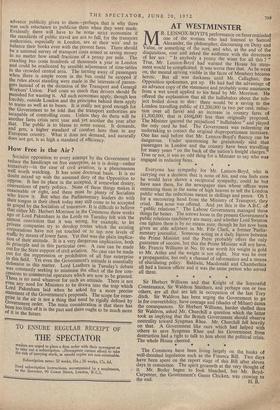How Free is the Air ?
Socialist opposition to every attempt by the Government to reduce the handicaps on free enterprise, as it is doing—rather tentatively—in the case of civil aviation, is a phenomenon well worth watching. It has some doctrinal basis. It is no doubt mixed up with the assumed duty of the Opposition to oppose. It has its place in the accepted, if somewhat dreary, conventions of party politics. None of these things makes it reasonable or right, and there must be plenty of Socialists who know it. But what the Parliamentary leaders do with their tongue in their cheek today may still come to be accepted as gospel by the Socialists of tomorrow. It is difficult to believe that either Mr. Herbert Morrison in the Commons three weeks ago or Lord Pakenham in the Lords on Tuesday felt with the utmost conviction that it was wrong, for example, to let private companies try to develop routes which the existing corporations have not yet touched or to tap new levels of traffic by means of lower fares. Yet that was the plain implica- tion of their attitude. It is a very dangerous implication, both in principle and in this particular case. A case can be made out for the State support of civil aviation. No case can be made out for the suppression or prohibition of all free enterprise in this field. Yet even the Government's attitude is essentially defensive in this matter. Lord Leathers in Tuesday's debate was constantly seeking to minimise the effect of the few con- cessions to commercial operators which are now to be granted. There is no need whatever for such an attitude. There is not even any need for Ministers to be drawn into the trap which Lord Pakenham laid when he asked for a more precise statement of the Government's proposals. The scope for enter- prise in the air is not a thing that need be rigidly defined by Government order. The main consideration is that there has been too little of it in the past and there ought to be much more of it in the future.


















































 Previous page
Previous page